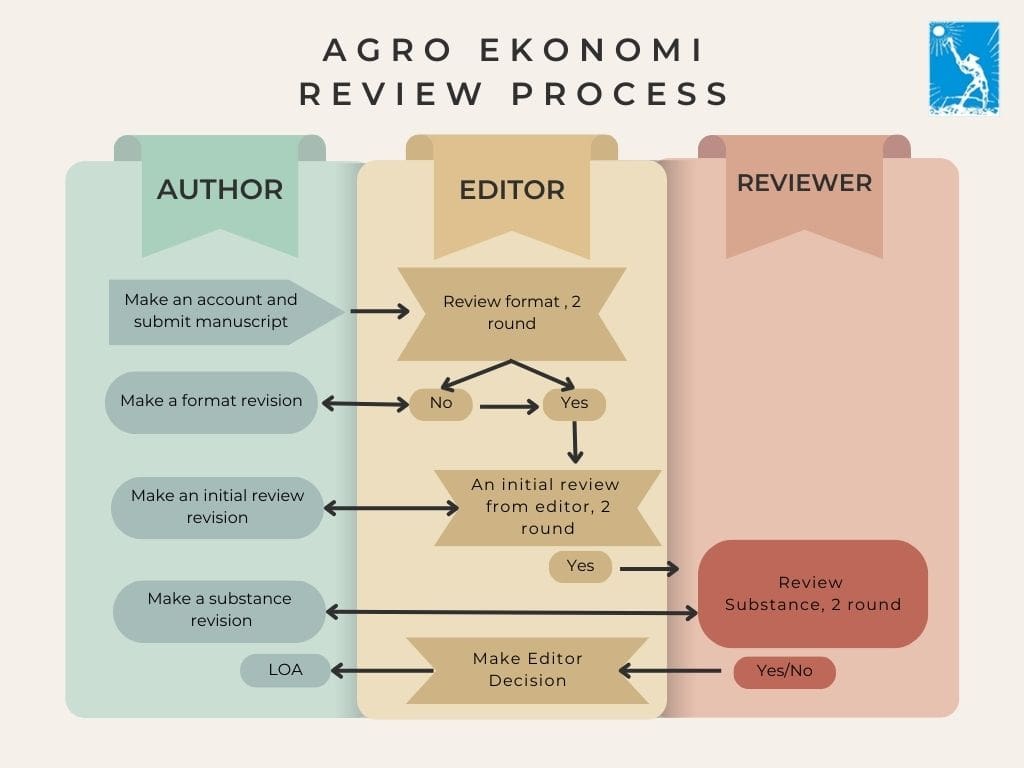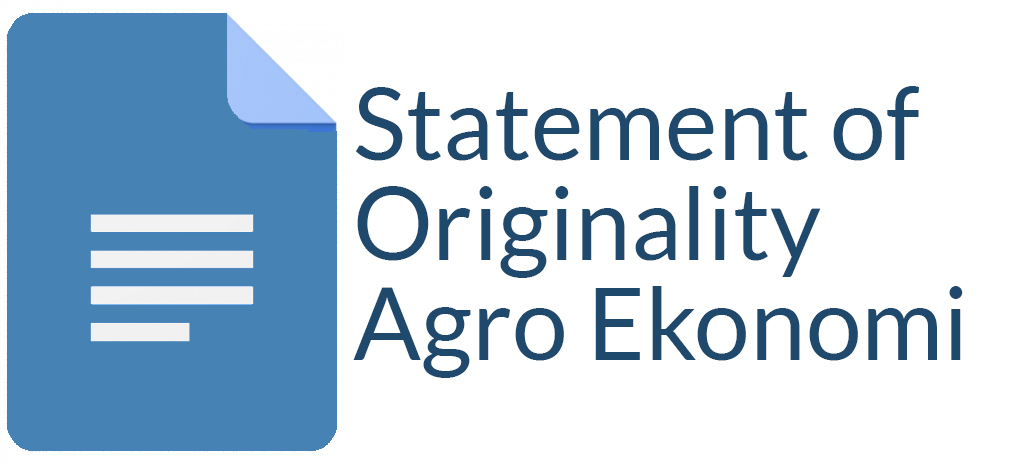Farmer Preference to High Elevation Rice Technological Packages for Accelerating Technological Dissemination (A case Study in Humbang Hasundutan Regency)
Agung B Santosa(1*), Setia Sari Girsang(2), Tommy Purba(3), Deddy R Siagian(4), Khadijah E Ramija(5)
(1) Assessment Institute for Agricultural Technology North Sumatra
(2) Assessment Institute for Agricultural Technology North Sumatra
(3) Assessment Institute for Agricultural Technology North Sumatra
(4) Assessment Institute for Agricultural Technology North Sumatra
(5) Assessment Institute for Agricultural Technology North Sumatra
(*) Corresponding Author
Abstract
Accelerating the introduction of a new technological package is needed to increase the productivity of high elevation puddled rice in Humbang Hasundutan. The objectives of the study are to find out the perception of the existence of technological packages and farmers' preference for a new technological package. The study used a survey method with primary data gathered using questionnaires. The criteria of locations and respondents were used to obtain relevant respondents and data concerning their knowledge of high elevation puddled rice cultivation. The collected data were processed by using Importance Performance Analysis in order to find out the level of Importance and Satisfaction of the indicators and the valued aspects in the technological package components. The results of the study showed that the socio-economic aspects had to be heeded in organizing the technological package. Indicators having a high level of importance and a low level of satisfaction consisted of production cost, quality of seeds, farmer groups empowerment, technology information institution, capital cost, agricultural tools and machines, pest control, sales price, irrigation canals, and farm roads. On the other hand, introducing new superior seeds, productivity attribute and planting age were important indicators for local farmers as to improve the quality of existing seeds. Farmers group expected that the technological package had a high level of productivity, better access to input, low cost, and good user-friendliness in its application.
Keywords
Full Text:
PDFReferences
Adri, J., Erizon, N., Mesin, T., Padang, U. N., & Guna, T. T. (2018). Application of Appropriate Technology for Rice Weed Weeds in The River Duo Village. Jurnal Pengabdian Masyarakat, 1(2), 42–49.
Akahashi, K. A. T., & Arrett, C. H. B. B. (2013). The System of Rice Intensification and Its Impacts on Household Income and Child Schooling: Evidence From Rural Indonesia. J. Agr. Econ, 96(1), 269–289. doi:10.1093/ajae/aat086
Awotide, B. A., Karimov, A. A., & Diagne, A. (2016). Agricultural Technology Adoption , Commercialization and Smallholder Rice Farmers ’ Welfare in Rural Nigeria. Agricultural and Food Economics, 4(3), 1–24. doi:10.1186/s40100-016-0047-8
BPS. (2020a). Humbang Hasundutan Regency in Figures (1st ed.). Humbang Hasundutan: BPS Humbang Hasundutan.
BPS. (2020b). Produk Domestik Regional Bruto Provinsi Sumatera Utara Menurut Lapangan Usaha (1st ed.). Medan: BPS Sumatera Utara.
Buresh, R. J., Castillo, R. L., Carla, J., Torre, D., Laureles, E. V, Samson, M. I., … Guerra, M. (2019). Field Crops Research Site-specific nutrient management for rice in the Philippines : Calculation of field-specific fertilizer requirements by Rice Crop Manager, 239(May), 56–70. doi:10.1016/j.fcr.2019.05.013
Chairuman, N. (2013). Adaptation Study of Paddy Varieties Based on An Integrated Crop Management in North Tapanuli Utara Provinsi Sumatera Utara. Jurnal Pertanian Tropik, 1(1), 47–54. doi:10.32734/jpt.v1i1.2867
da Cruz, R. P., Sperotto, R. A., Cargnelutti, D., Adamski, J. M., de FreitasTerra, T., & Fett, J. P. (2013). Avoiding Damage and Achieving Cold Tolerance In Rice Plants. Food and Energy Security, 2(2), 96–119. doi:10.1002/fes3.25
Dingkuhn, M., Rebecca, M., Laza, C., Kumar, U., Mendez, K. S., Collard, B., … Manneh, B. (2015). Improving Yield Potential of Tropical Rice: Achieved Levels and Perspectives Through Improved Ideotypes. Field Crops Research, 182(2015), 1–17. doi:10.1016/j.fcr.2015.05.025
Farida, U. (2013). The Effect of Accessibility on The Socio-Economic Characteristics of Rural Communities, Bumijawa District, Tegal Regency. Jurnal Wilayah Dan Lingkungan, 1(1), 49. doi:10.14710/jwl.1.1.49-66
Gunarsih, C., & Sitaresmi, T. (2017). Formation of Low Temperature Tolerant Upland Rice Varieties. Iptek Tanaman Pangan, 11(2), 107–118.
Hardyani, M. A. (2019). Growth Performance and Yield of Several Upland Rice Varieties on Upland Dry Land in Karo District. In Temu Teknis Jabatan Fungsional Non Peneliti (Pp. 17–19). Malang: IAARD PRESS. Retrieved from http://repository.pertanian.go.id/handle/123456789/8499
Haryati, U. (2014). Physical Characteristics of Soil in Upland Vegetable Cultivation Areas, Relation to Land Management Strategies. Jurnal Sumberdaya Lahan, 8(2), 125–138. doi:10.2018/jsdl.v8i2.6475
Hasanuzzaman, M., Hakeem, K. R., Nahar, K., & Alharby, H. F. (2019). Temperature Extremes: Impact on Rice Growth and Development. In Plant Abiotic Stress Tolerance: Agronomic, Molecular and Biotechnological Approaches (pp. 1–490). doi:10.1007/978-3-030-06118-0
Himire, R. G., Wen-chi, H. U., & Hrestha, R. B. S. (2015). Factors Affecting Adoption of Improved Rice Varieties among Rural Farm Households in Central Nepal. Rice Science, 22(1), 35–43. doi:10.1016/j.rsci.2015.05.006
Kami, M., Barz, M., Gheewala, S. H., & Sajjakulnukit, B. (2012). Environmental and Socio-Economic Feasibility Assessment of Rice Straw Conversion to Power and Ethanol in Thailand. Journal of Cleaner Production, 37(2012), 29–41. doi:10.1016/j.jclepro.2012.06.005
Luo, L., Qin, L., Wang, Y., & Wang, Q. (2016). Environmentally-Friendly Agricultural Practices and Their Acceptance by Smallholder Farmers in China — A Case Study in Xinxiang County , Henan Province. Science of The Total Environment, 571(2016), 737–743. doi:10.1016/j.scitotenv.2016.07.045
Moro, B. M., Nuhu, I. R., & Martin, E. A. (2016). Effect of Spacing on Grain Yield and Yield Attributes of Three Rice ( Oryza sativa Effect of Spacing on Grain Yield and Yield Attributes of Three Rice ( Oryza sativa L . ) Varieties Grown in Rain-fed Lowland Ecosystem in Ghana, 9(3), 1–10. doi:10.9734/IJPSS/2016/21911
Paudel, G. P., Bahadur, D., Bahadur, D., Justice, S. E., & Mcdonald, A. J. (2019). Scale-Appropriate Mechanization Impacts on Productivity among Smallholders : Evidence from Rice Systems in The Mid-Hills Of Nepal. Land Use Policy, 85(2019), 104–113. doi:10.1016/j.landusepol.2019.03.030
Perera, K. I. M., & Nanthakumaran, A. (2015). Technical Feasibility and Effectiveness of Vermicomposting at Household Level. Tropical Plant Research, 2(April), 51–57.
Ranaivoson, L., Naudin, K., Ripoche, A., Rabeharisoa, L., & Corbeels, M. (2019). Effectiveness of Conservation Agriculture in Increasing Crop Productivity in Low-Input Rainfed Rice Cropping Systems Under Humid Subtropical Climate. Field Crops Research, 239(January), 104–113. doi:10.1016/j.fcr.2019.05.002
Rashid, S. M. M., Islam, M. R., & Quamruzzaman, M. (2016). Which Factor Contribute Most to Empower Farmers Through E-Agriculture in Bangladesh? SpringerPlus, 5(1). doi:10.1186/s40064-016-3443-3
Saito, K., Asai, H., Zhao, D., Laborte, A. G., & Grenier, C. (2018). Progress in Varietal Improvement for Increasing Upland Rice Productivity in The Tropics. Plant Production Science, 21(3), 1–14. doi:10.1080/1343943X.2018.1459751
Savary, S., Horgan, F., Willocquet, L., & Heong, K. L. (2012). A Review of Principles for Sustainable Pest Management in Rice. Crop Protection, 32(2012), 54–63. doi:10.1016/j.cropro.2011.10.012
Suvi, W. T., Shimelis, H., & Laing, M. (2020). Farmers’ Perceptions, Production Constraints and Variety Preferences of Rice in Tanzania. Journal of Crop Improvement, 00(00), 1–18. doi:10.1080/15427528.2020.1795771
Wang, Z. L., Shen, H. C., & Zuo, J. (2019). Risks in Prefabricated Buildings in China: Importance-Performance Analysis Approach. Sustainability (Switzerland), 11(12). doi:10.3390/su10023450
Article Metrics
Refbacks
- There are currently no refbacks.
Copyright (c) 2018 Agro Ekonomi

This work is licensed under a Creative Commons Attribution-ShareAlike 4.0 International License.
View My Stats












